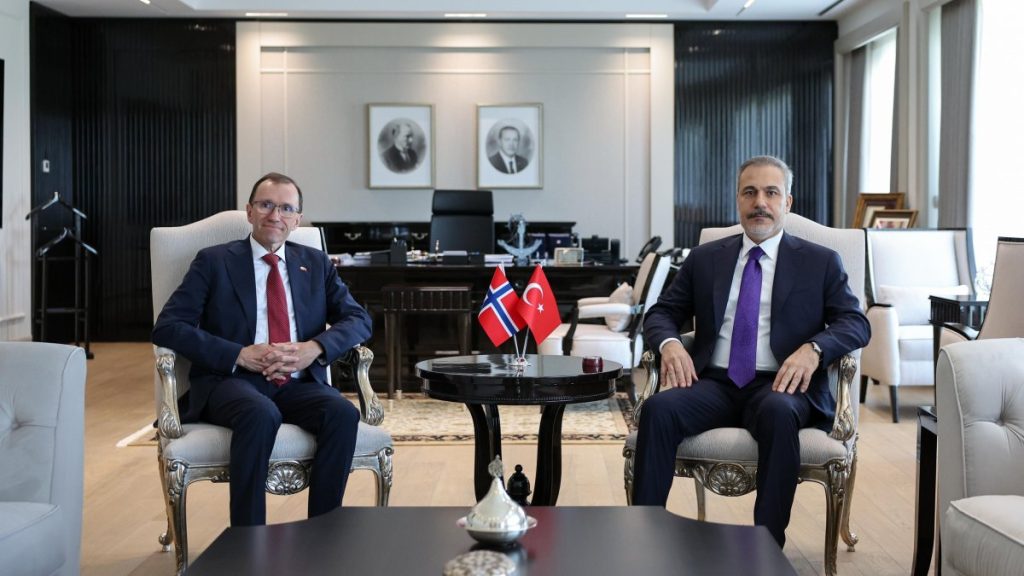Foreign Minister Hakan Fidan said on Thursday that Türkiye would maintain ties with Turkic states in the face of attempts to sever them, saying the states’ cooperation with Greek Cypriots was a family matter they may resolve among themselves.
He was speaking in the capital Ankara at a news conference with his Norwegian counterpart, days after several members of the Organization of Turkic States (OTS) moved to recognize the Greek Cypriot administration on the divided island of Cyprus, allegedly to secure deals with European Union countries.
Uzbekistan, Kazakhstan, Kyrgyzstan, three full members of the OTS, and observer state Turkmenistan, have formally recognized the Greek Cypriot administration, in contrast with Türkiye, which does not recognize it and has long worked for international recognition of the Turkish Republic of Northern Cyprus (TRNC) as an independent state.
At the news conference with Norwegian Foreign Minister Espen Barth Eide, Fidan said that under the leadership of President Recep Tayyip Erdoğan, Türkiye has pursued better relations with the Turkic world. He also underlined that global developments and increasing capacity demonstrated by “our brothers in Central Asia” drew the attention and interest of the European Union to Central Asia as well.
“It is understandable but we, at times, see the European Union exploiting this situation,” he said. Media reports said the EU preconditioned recognition of the Greek Cypriot administration in exchange for lucrative deals with the four Asian countries.
Fidan stated that they were in touch “with friends” and exchanged views on the matter.
“We will continue to adhere to our Turkic world ideal,” he emphasized.
Fidan, however, complained of “another problem.”
“Some circles are trying to incite strife among us through this latest episode. They want us to discuss the matter publicly. But our principal is not discussing a family matter publicly. Manipulation by those trying to sow discord between Türkiye and the Turkic world will fail. Efforts to defame our government on this matter will also fail,” he said, referring to criticism that Ankara remained quiet in the face of the recognition.
“Our stance is clear. Our steps defined the course we would like to pursue with the Turkic states. We will act with common sense. We will discuss all matters in our family assembly,” he said.
The minister added that Turkish Cypriots were primary, inseparable parts of the Turkic world and this would “never change.”
“The Turkic world, as a whole, will continue standing with Turkish Cypriots. We will adhere to our policies,” he stated.
The island of Cyprus has been mired in a decadeslong struggle between Greek and Turkish Cypriots, despite a series of diplomatic efforts by the U.N. to achieve a comprehensive settlement. Five decades of Cyprus talks have led nowhere. The status of the island remains unresolved, in spite of a series of negotiations over the years. While Greece and the Greek Cypriot administration support a federation on Cyprus, Türkiye and the TRNC insist on a two-state solution reflecting the realities on the island.
Fidan said there was a frozen conflict on the island, with both sides continuing to live within their own borders under their own administrations.
“However, the mutual isolation they impose on each other has begun to negatively impact the island’s overall prosperity. Especially in recent years, considering the geostrategic and geoeconomic developments in the Mediterranean, the island of Cyprus is increasingly becoming isolated from the region and drifting toward further alienation from Türkiye. Instead, we have emphasized the importance of fostering a spirit of cooperation on the island, aligning with the United Nations’ vision. No matter what the Greek Cypriots or the European Union say, the exhausted federation model is no longer on the table. As you know, this model was dismantled by the Greek Cypriots in both attempts. But a negotiation process, a solution process, or an agreement process that aims to further isolate Turkish Cypriots and force them into greater hardship is in no way acceptable, reasonable or justifiable,” he said.
“Of course, we respect the will of our Greek Cypriot friends. They are making their own choices on this matter. But as a guarantor country, we always state our views and position with utmost clarity,” he added.


